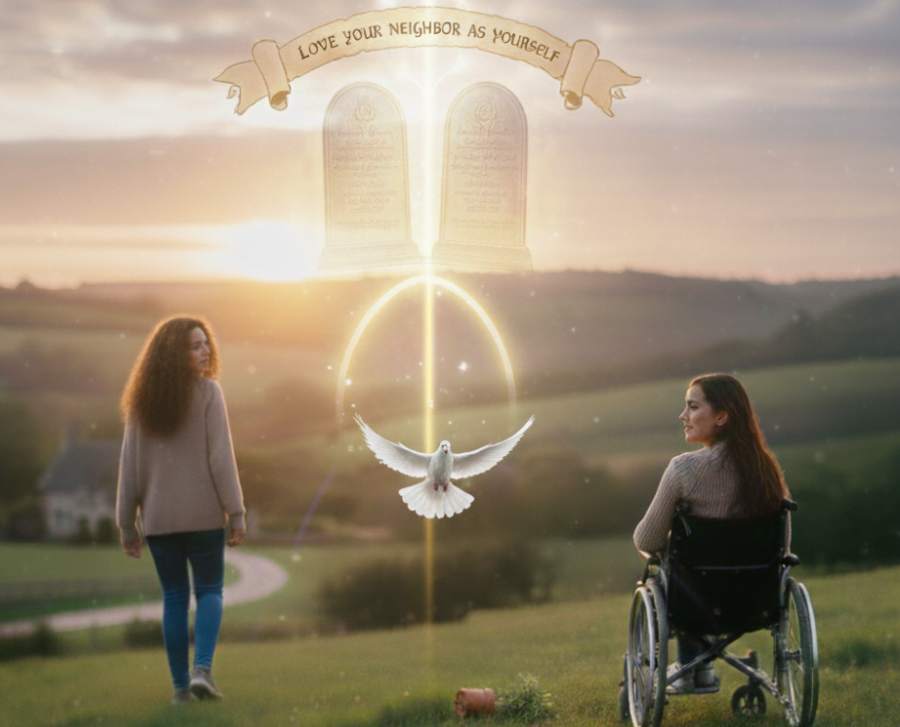
When Friendship Feels Fractured: A Biblical Guide to Navigating Conflict
The text sits unanswered on your phone. The group chat feels awkward since the disagreement. You’ve replayed the conversation in your mind a hundred times, oscillating between hurt and anger. The friend who used to be your safe person now feels like a source of stress, and you’re not sure how to fix it – or if it even can be fixed.
Welcome to one of the most painful realities of adult friendship: conflict. For women in our 20s and 30s, friendship conflicts can feel especially disorienting. We want our friendships to be life-giving, not complicated. But real relationships with real people inevitably involve misunderstanding, hurt feelings, and moments when love feels harder than we expected.

The Biblical Foundation
Scripture doesn’t shy away from the reality of conflict. Paul and Barnabas had a “sharp disagreement” (Acts 15:39). Even Jesus had difficult conversations with his disciples. But the Bible also provides clear guidance for handling conflict. Matthew 18:15-17 gives us a process: go directly to the person first. Ephesians 4:26-27 warns us not to let the sun go down on our anger. Colossians 3:13 calls us to “bear with each other and forgive.”
The biblical approach is radically different from cultural defaults. We’re told to address issues directly rather than venting to everyone else. We’re called to pursue reconciliation rather than waiting for the other person to make the first move. We’re instructed to forgive, even when it’s hard.
Common Sources of Friendship Conflict
Many conflicts stem from unmet expectations that were never clearly communicated. You expected her to show up for an important event and she didn’t. She thought you’d text more frequently. These unspoken assumptions create fertile ground for hurt feelings.
Life season transitions naturally create friction. She got married while you’re still single. You had a baby and she doesn’t understand why you can’t meet up like before. Career demands create distance. Different life stages don’t have to end friendships, but they require grace and adjustment.
Miscommunication is amplified in our digital age. Text messages are misread. Tone is misinterpreted. What was meant as a joke lands as an insult. Add social media into the mix and conflicts that used to stay private now play out where everyone can see.
Boundary violations create real problems. Maybe she shares your private struggles with others, consistently cancels plans last minute, or makes jokes at your expense. When boundaries are crossed repeatedly, conflict often follows.

Biblical Steps to Navigate Conflict
Start by examining your own heart. Before approaching your friend, take your feelings to God. Matthew 7:3-5 reminds us to remove the plank from our own eye first. Ask yourself: Am I hurt over something legitimate, or am I being oversensitive? Have I contributed to this conflict? Are my expectations reasonable? Is my heart attitude one of love or self-righteousness?
This isn’t about talking yourself out of legitimate hurt. It’s about approaching conflict with humility, recognizing that you might not have the full picture.
Go directly to your friend. This is where Matthew 18:15 becomes practical: go to the person privately, just between the two of you. Notice what Jesus doesn’t say: don’t post about it vaguely on social media, don’t vent to all your other friends first, don’t send passive-aggressive texts hoping she’ll get the hint.
Going directly to someone feels vulnerable, but it’s the most loving approach. It gives her a chance to explain, apologize, or offer a perspective you hadn’t considered. Choose face-to-face interaction or at least a phone call – not text messages where tone is easily misread.
Use “I” statements and own your feelings. Instead of “You always…” try “I felt hurt when…” This focuses on your experience rather than attacking her character. For example: “I felt hurt and unimportant when you didn’t show up to my event” rather than “You’re a terrible friend who doesn’t care about me.”
Listen to understand, not to defend. This might be the hardest part. When your friend responds, really listen. Don’t spend the whole time planning your rebuttal. James 1:19 instructs us to be “quick to listen, slow to speak and slow to become angry.” Ask clarifying questions. Give her the same grace you’d want extended to you.
Apologize for your part. Even if you believe the conflict is primarily her fault, there’s almost always something you could have done differently. A genuine apology sounds like: “I’m sorry for…” followed by specific actions, not excuses. “I’m sorry I gossiped about this to other friends before coming to you.”
Extend and receive forgiveness. Colossians 3:13 tells us to forgive “as the Lord forgave you.” This doesn’t mean pretending the hurt didn’t happen or immediately trusting as if nothing changed. It means releasing your right to hold the offense against her and choosing to move toward reconciliation.
Forgiveness is both a decision and a process. You might need to choose forgiveness multiple times as hurt resurfaces. Don’t hold the conflict over her head or bring it up in future disagreements.

When Reconciliation Doesn’t Happen
Sometimes you do everything right and the friendship still doesn’t heal. She might not be willing to talk. The conversation might go badly. You might realize that the relationship has become unhealthy and needs to end.
Biblical conflict resolution doesn’t mean staying in toxic friendships, enabling harmful behavior, or sacrificing your wellbeing for “keeping the peace.” Sometimes the most loving thing is creating distance or letting a friendship go.
If reconciliation doesn’t happen, release it to God. Romans 12:18 says, “If it is possible, as far as it depends on you, live at peace with everyone.” You can’t control her response, but you can control your own heart.
Resist the urge to gossip. Even if she’s hurt you, speaking badly about her to others doesn’t honor God. If you need to process, talk to a mentor, counselor, or one trusted friend who isn’t connected to the situation.
Grieve the loss. It’s okay to be sad when a friendship ends or changes. Don’t minimize your grief. Bring it to God and let him comfort you.
Learn from the experience. What can this conflict teach you about yourself, your patterns in relationships, or areas where you need to grow?
The Greater Purpose
Here’s the transformative truth: God uses these painful moments to make us more like Jesus. When we choose humility over pride, reconciliation over being right, and forgiveness over bitterness, we’re reflecting Christ’s character.
Jesus pursued reconciliation with us at incredible cost. He extended forgiveness we didn’t deserve. Every time we navigate conflict biblically, we’re displaying the gospel in miniature – showing that relationships are worth fighting for, that forgiveness is possible, and that love covers a multitude of sins.
Conflict also reveals what’s in our hearts. It exposes our pride, our need for control, our struggle to truly forgive. When we let God work through these revelations rather than running from them, we grow in ways we wouldn’t otherwise.

Moving Forward with Hope
If you’re in the middle of friendship conflict right now, take heart. God cares deeply about your relationships and wants to bring healing. He’s not surprised by this struggle, and he hasn’t left you to navigate it alone.
Start with prayer. Ask God for wisdom, humility, and courage. Confess your own sin. Ask him to soften both your heart and your friend’s heart toward reconciliation.
Then take the next faithful step. Maybe it’s sending that text asking to talk. Maybe it’s examining your own heart more honestly. Maybe it’s extending forgiveness you’ve been withholding. Maybe it’s letting go of a friendship that needs to end.
Whatever that next step is, trust that God is with you in it. The same God who reconciled you to himself through Christ can bring healing to your friendships. And whether this particular friendship is restored or not, he’s using this experience to make you into the kind of woman who loves well, forgives freely, and reflects his heart to the world.
Your friendships matter to God. And so do you.
“If it is possible, as far as it depends on you, live at peace with everyone.” – Romans 12:18
This article really met me where I am. Navigating friendship conflict as an adult has been far more disorienting than I expected, especially when it involves someone I trusted deeply. I appreciate how this piece doesn’t downplay the hurt but instead provides a framework rooted in grace and accountability.
The reminder to examine my own heart first hit home. I’ve had times where I felt justified in my frustration, but when I brought it to God, I realized I had some pride and assumptions I needed to lay down too.
But when reconciliation feels one-sided or your friend isn’t responsive, how do you personally know when to create distance versus keep reaching out?
Thank you for sharing so honestly — your reflection really resonates. Adult friendships can be surprisingly complicated, especially when trust is involved, and it takes courage to face both your own heart and the reality of the other person’s responses.
When reconciliation feels one-sided, I’ve found it helpful to pay attention to a few things: whether repeated efforts are met with openness or resistance, whether continuing to reach out drains your peace rather than fosters connection, and whether clear, healthy boundaries are being respected. Creating distance doesn’t mean giving up; sometimes it’s necessary for your own emotional and spiritual health while still leaving the door open for future dialogue.
Ultimately, prayer and discernment are key — asking God to guide your timing and approach, and to help you distinguish persistence motivated by love from persistence motivated by guilt or pride. Often, space allows both hearts to reflect and heal, making authentic reconciliation more possible in the long run.
The “Biblical Steps to Navigate Conflict” section really resonated with me because it beautifully balances honesty, humility, and hope. I loved how it emphasizes self-reflection before confrontation starting with our own hearts and motives. The reminder from Matthew 7:3–5 to remove the plank from our own eye first is such a powerful call to humility. The practical guidance on using “I” statements and prioritizing understanding over defensiveness felt deeply compassionate and realistic, especially in an age of quick texts and misunderstandings. It’s a refreshing, grace-filled approach that reflects Jesus’ heart for reconciliation. How can churches better teach and model these biblical conflict-resolution principles within small groups or ministries? And what role does accountability play when reconciliation proves difficult or one-sided?